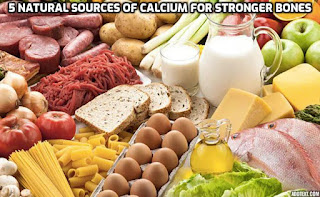Click HERE To Uncover the Secrets of Strong Bones & Healthy Joints
Maintaining strong and healthy bones is essential for overall well-being, and calcium plays a pivotal role in achieving this. While many people associate calcium primarily with dairy products, there are numerous natural sources of this vital mineral that can be easily incorporated into a balanced diet.
In this blog post, we’ll explore five natural sources of calcium that can contribute to stronger bones.
- Leafy Greens: Leafy green vegetables are not only rich in vitamins and minerals but also serve as excellent sources of calcium.
Vegetables such as kale, broccoli, collard greens, and bok choy are loaded with bioavailable calcium that the body can readily absorb.
Including a variety of these greens in salads, smoothies, or stir-fries can boost your daily calcium intake.
- Dairy Products: Dairy products remain one of the most well-known sources of calcium.
Milk, yogurt, and cheese are not only rich in calcium but also provide a good dose of vitamin D, which aids in calcium absorption.
For those who are lactose intolerant or follow a plant-based diet, there are alternative sources such as fortified plant milks and yogurts.
- Fish with Edible Bones: Certain types of fish come with the added benefit of edible bones, providing an extra calcium boost. Canned salmon and sardines are excellent examples.
These small, nutrient-dense fish not only offer omega-3 fatty acids but also a significant amount of calcium. Incorporating them into your diet, whether in salads or sandwiches, is a tasty way to support bone health.
- Nuts and Seeds: Almonds, chia seeds, and sesame seeds are rich in calcium and make for convenient snacks or additions to various dishes.
Incorporating these nuts and seeds into your diet can not only contribute to your calcium intake but also provide additional nutrients like magnesium and phosphorus, which are essential for bone health.
- Fortified Foods: In addition to naturally occurring sources of calcium, many foods are fortified with this crucial mineral. Common examples include fortified cereals, tofu, and certain types of fruit juices.
Checking food labels for calcium content and opting for fortified options can be a simple and effective way to enhance your overall calcium intake.
Tips for Incorporating Calcium-Rich Foods into Your Diet:
- Diversify Your Plate: Aim for a variety of calcium-rich foods to ensure you get a broad spectrum of nutrients.
- Cooking Methods: Explore different cooking methods to make these foods more appealing, such as roasting vegetables or incorporating nuts and seeds into recipes.
- Meal Planning: Plan meals that incorporate calcium-rich foods, ensuring you meet your daily requirements.
- Supplementation: If necessary, consult with a healthcare professional about calcium supplements to meet your specific needs.
In addition to dietary choices, adopting certain lifestyle habits can further enhance the effectiveness of your efforts to maintain strong bones.
Regular Exercise: Engaging in weight-bearing exercises, such as walking, jogging, or weightlifting, can help stimulate bone growth and increase bone density.
Combine these activities with muscle-strengthening exercises for a comprehensive approach to bone health.
Remember to consult with a fitness professional or healthcare provider to tailor an exercise regimen suitable for your individual needs.
Adequate Vitamin D Intake: Vitamin D is essential for calcium absorption in the body. Spending time outdoors in the sunlight is a natural way to boost your vitamin D levels.
Additionally, include vitamin D-rich foods like fatty fish, egg yolks, and fortified dairy or plant-based products in your diet. If necessary, vitamin D supplements may be recommended, especially for individuals with limited sun exposure.
Limiting Caffeine and Soda Intake: High consumption of caffeine and soda has been associated with decreased calcium absorption.
Consider moderating your intake of these beverages and, when possible, opting for alternatives like herbal teas or water to support optimal calcium absorption.
Avoiding Excessive Alcohol: Heavy alcohol consumption can negatively impact bone health by interfering with the body’s ability to absorb calcium.
If you choose to consume alcohol, do so in moderation, following recommended guidelines to minimize its potential impact on your bones.
Regular Health Check-ups: Regular check-ups with your healthcare provider can help monitor your bone health and identify any potential issues early on. This is particularly important for individuals with specific risk factors, such as a family history of osteoporosis or certain medical conditions.
Remember, maintaining strong bones is a lifelong commitment that requires a combination of proper nutrition, regular exercise, and a healthy lifestyle.
By incorporating these practices into your daily routine, you can take proactive steps toward ensuring the longevity and strength of your bones.
Watch this video – Strengthen your bones the natural way | Dr. Hansaji Yogendra
In conclusion, the quest for stronger bones involves a holistic approach that goes beyond merely focusing on calcium-rich foods.
By embracing a well-rounded lifestyle that includes a diverse diet, regular exercise, and mindful choices, you can lay a foundation for robust bone health throughout your life.
If you have specific concerns or conditions related to bone health, consult with healthcare professionals for personalized advice and guidance tailored to your individual needs.
Click HERE To Uncover the Secrets of Strong Bones & Healthy Joints


No comments:
Post a Comment